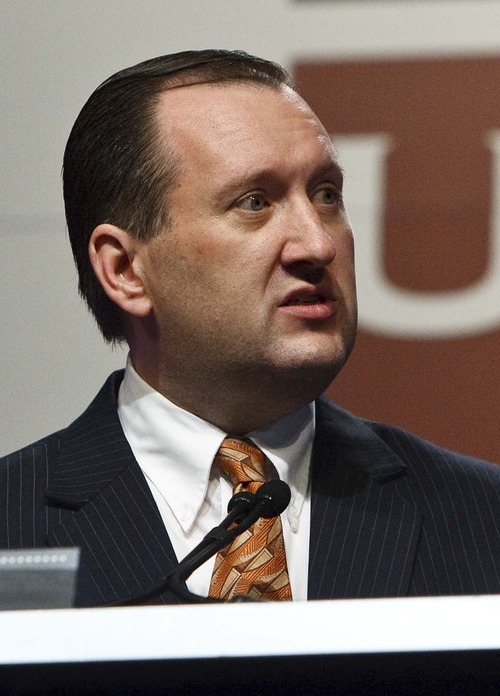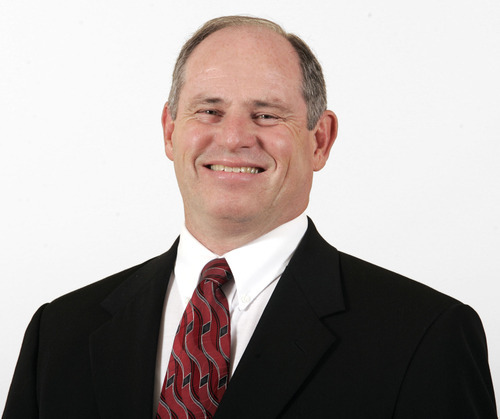This is an archived article that was published on sltrib.com in 2012, and information in the article may be outdated. It is provided only for personal research purposes and may not be reprinted.
For the first time in 40 years, Utah is about to elect a state auditor who is not a certified public accountant.
Outgoing Auditor Auston Johnson, who lost the Republican primary, and his predecessor worry that could make the office less professional and independent, and even cost Utah its AAA bond rating. So Johnson is declining to endorse any of the remaining candidates, who are not CPAs.
But those candidates — Republican John Dougall, Democrat Mark Sage and Constitution Party nominee Richard Proctor — say being a CPA is not essential, even though the new state auditor personally will not be able to sign the state's financial audits.
Former Auditor Tom Allen, who heads a board that sets accounting standards for the federal government and is former chairman for a similar board over state and local governments, compares it to having a non-attorney as state attorney general.
"Could an attorney general do a good job and not be an attorney? The answer is probably yes if he was an effective manager of people and attorneys — but it's helpful, and I think it is a requirement, that the attorney general be an attorney," he said.
Former state Auditor Val Oveson takes the other side.
Oveson endorsed Dougall after Johnson — his original preference — lost the June GOP primary. He said being a CPA is not necessarily essential. "It depends on how they handle it. I think John will do fine" in relying on professionals — and using his background in budgets and government to oversee them.
Utah does not require its state auditor to be a CPA.
—
Tradition • Nevertheless, every state auditor going back to 1972 has been a CPA. Oveson said the office transformed about the time he served (1981-85) from essentially being the state's accountant to its auditor — giving independent opinions about financial statements that it was not involved in preparing.
"If we weren't doing that, we wouldn't be getting the accolades that we are as the best managed state," Oveson said.
Still, having a state auditor who is not a CPA is not unusual nationally.
In fact, only 25 of the 50 current state auditors or comptrollers are CPAs, according to the National Association of State Auditors, Comptrollers and Treasurers.
"But seven out of the eight states that have [top] AAA bond ratings, their auditor is a CPA," incumbent Johnson, who took office in 1995, said.
"It would be hard to direct an office of professionals when you are not a professional yourself. Somebody in this office has to break the ties and decide the arguments and set the direction," Johnson said. "Those are all professional experience-type decisions. If the state auditor isn't making those decisions, who is?"
Utah is one of 26 states that has no educational requirement for its state auditor. Fourteen states require that they be CPAs, and another 10 require degrees or experience in accounting or auditing. Utah is among 18 states where state auditors or comptrollers are elected, and the rest are appointed.
—
Concerns • Former Auditor Allen says he has "large potential concerns" about a non-CPA as the state auditor. "Not being a CPA, he will not be able to sign the audit of the state's financial statements and say they are conducted in accordance with professional standards."
Allen says another concern is how independent and professional a non-CPA auditor may be. He worries that Dougall, the front-runner in a heavily Republican state, is too tied to the Legislature as a current lawmaker who has received about a third of his campaign funding from fellow legislators.
In the primary, Dougall defeated Johnson, who had run-ins with lawmakers on audits that looked into some of them or their friends — leading legislators at one point to give raises to all statewide elected officials but Johnson.
Allen said, "Here we have a legislator who is financed by other legislators, and there's always friction with the legislative process. So I'm really concerned that someone can be independent" in that situation.
Democrat Sage similarly attacks Dougall. "We have seen where Auditor Johnson has run afoul of our Legislature, and it took some retribution against him, not providing him with a raise and supporting the current Republican candidate with donations. That would make him [Dougall] more beholden to the Legislature."
Dougall shrugs off the criticisms.
"Nobody has been more independent in the Legislature than I have, I think. But when you look, very little of what the state auditor does has to do with the Legislature. Most of what the state auditor does is oversee state and local governments. And having an understanding of how government operates and where the money is going ... and where there is risk to taxpayers, that's what's critical."
Dougall said it is more important to have someone with an in-depth understanding of how government works and its budgets who can direct CPAs and others. "I'm the number two guy in the House in charge of the whole state budget," he said. He also has a Master of Business Administration and master's and bachelor's degrees in electrical engineering and is a high-tech consultant, so, "I'm a numbers guy."
Democrat Sage, a former private investigator and former program manager for the U.S. Air Force, said not being a CPA "is not a big deal for me. I have experience working with hundreds of millions of taxpayer dollars, and I was held accountable for all that money." CPAs, he said, can be hired to do necessary certifications.
Constitution Party nominee Proctor, an entrepreneur, said he has always done his own accounting, and feels being a CPA is not necessary. If it were, he said, "I guess we should not have let Henry Ford own a car company because he didn't have enough education."





